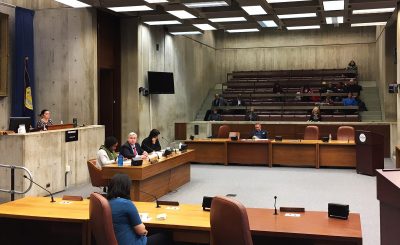Boston’s City Council Committee on Ways and Means, which oversees government spending, is holding public hearings this week to review the proposed Fiscal Year 2022 budget.

The current recommended budget totals $3.75 billion — an increase of 3.9% — in spending compared to FY21, which ends June 30.
The review started Monday, with City Councilor and Committee Chair Kenzie Bok explaining the focus of the day’s meeting: a general overview of the FY22 Budget and the revenue projections it’s based on.
“The City of Boston’s budget really is a list of its priorities,” she said. “There’s never been a more important moment as we think about how to bring the city back from this really hard season that we’ve been in, how to use the federal money that we’re getting responsibly, but also every one of your municipal tax dollars.”
A presentation by Justin Sterritt, chief financial officer and collector-treasurer for the city of Boston, followed Bok’s introduction.
“The city entered the pandemic in a very enviable position compared to most, if not all, of our sister cities across the country,” Sterritt said.
Sterritt said the overarching goal this year is to “build back stronger” and more equitably, prioritizing investment in the interests of the public.
The City expects revenue to grow, but less than in recent historic years, Sterritt said. The 2022 fiscal year is projected to see revenue increases of about $142 million — primarily derived from property taxes and federal funding.
The current plan — submitted to the City Council April 14 — does not contain any layoff or service cuts and allocates more than $1.5 billion for public education, including Boston Public Schools and charter schools, Sterritt said.
Tuesday’s hearing, chaired again by Bok, focused on the FY22 budget overview for the Boston Public Schools. BPS Superintendent Brenda Cassellius said the pandemic exposed systemic inequities in the public school system.
“We have been and continue to remain guided by the belief that every single child, in every classroom, in every school, deserves the same,” she said. “Sometimes, for some of our historically underserved communities, even greater opportunity to learn, grow and thrive.”
The current recommendation allocates $1.3 billion to BPS, compared to just more than $1 billion in 2021.
Looking forward, Cassellius said BPS will focus on improving education, promoting an equitable recovery and promoting communitywide health and wellness.
Two major financial boosts the public education sector will be receiving are the statewide Student Opportunity Act and the federal American Rescue Plan, Pam Kocher, president of the Boston Municipal Research Bureau, said.
As she explained, the SOA is a long-term commitment by the state government. Starting with FY22 July 1, the new program will increase cities’ public education funding — Boston included.
Comparatively, the American Rescue Plan is a federally funded initiative specifically aimed at helping schools address their students’ needs as they return to in-person learning. This federal stimulus, Kocher said, is not meant to be a permanent addition to the city’s available funds, but a boost provided to help manage the effects of the COVID-19 pandemic.
“One of the things that they’re doing for the students is spending some additional money, so increasing their budget, to bring on some new staff that will help support some of the challenges that students are expected to have coming back,” she said. “It’s been a tough year for some families and their children.”
Another key area of reform for the Fiscal Year 2022 Budget is the funding of new police-related programs and offices. These include the new Office of Police Accountability and Transparency, which the City recommended receive $1 million in funding as well as a $1.75 million investment to create an alternative policing program.
Additionally, a new Equity Cabinet will be funded, which will include the Office of Equity and the Office of Language and Communications Access departments.
Funding shifts for the Boston Police Department will focus on bettering the force’s accountability and transparency by cutting overtime spending and making targeted investments, according to an April 15 press release.
“During the past year, Boston has come together like never before, and we must take that spirit of inclusiveness and compassion and translate it into real investments for the City of Boston and our residents,” Mayor Kim Janey stated in the release.
As Cassellius noted, the new funding and budget priorities for the fiscal year 2022 will allow the city to address inequalities and pervasive social issues.
“We now have a once-in-a-lifetime opportunity to bridge these longstanding opportunity gaps,” Cassellius said, “and to ensure high-quality schools are across all our neighborhoods.”














